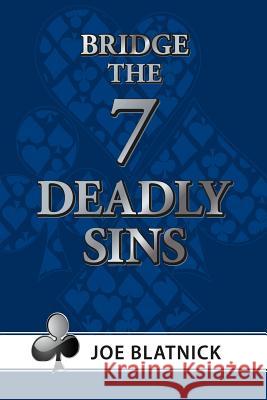The Seven Deadly Sins » książka
The Seven Deadly Sins
ISBN-13: 9781468522983 / Angielski / Miękka / 2012 / 160 str.
As new players continue the learning process, they try to follow all those cliches and myths with which they are inundated. As they progress through the learning stages, they begin to appreciate why these guidelines have exceptions, and get better at recognizing them. But once they reach a certain level of competence, there is a fork in the road. Those who don't wish to learn any more or those who feel that more learning is either beyond them or a waste of time take one branch of that road. The others become so enamoured or addicted, if you will, that they can't get enough of the game, take the other road. They want to play as often as humanly possible. They want to learn every convention which has ever surfaced (good or bad) and they read every bridge book that has been written. They endeavour to play with those from whom they can learn and never hesitate to engage their local experts in conversation about this wonderful game. However, even after reaching a level which is not far above the beginner stage, they feel that they are ready for advanced classes. There are others who can play a respectable game and are still a long way from expert level who feel that they too, belong only in advanced classes. Yet there is a common denominator for all these players regardless of the group to which they belong. And that is the basics. Very few bridge players truly know the basics. In an upcoming book, I mention a hundred mistakes which are made by many players who are seldom aware of 5% of them. All this preamble brings us to the point of this book. And that is that all those experienced players who play regularly but seldom win are guilty of committing the seven deadly sins of bridge. If those aspiring to become experts really want to reach the pinnacle, they must learn the basics and stop committing the 7 deadly sins. As we are all aware, this game breaks down into bidding, declarer play and defence. Each of these sections, if a more complete examination were made, would reveal many troublesome situations. However, this book will deal primarily with errors of omission and not commission. And since the title suggests only seven, the author's omissions might be considered as errors. The seven deadly sins of bridge will highlight what would appear to be the most lacking aspects of the average player's game, oops 8.











